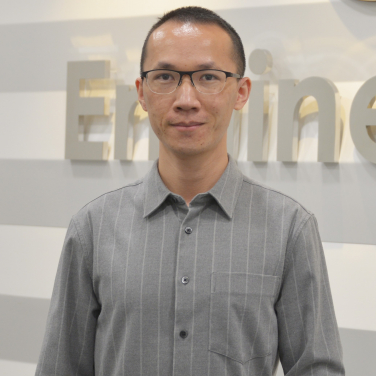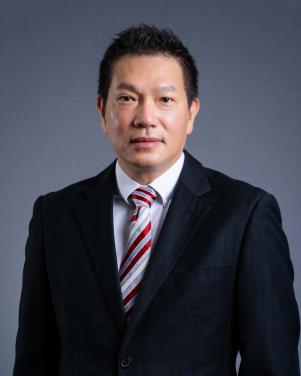Media
Six HKU research teams receive US National Academy of Medicine
Health Longevity Catalyst Award (Hong Kong) 2022
08 Jan 2023

Li Ka Shing Faculty of Medicine, HKU
(from left) Professor Liu Pengtao, Dr. Yuan Shuofeng, Dr. Ruan Degong and Li Zhuoxuan
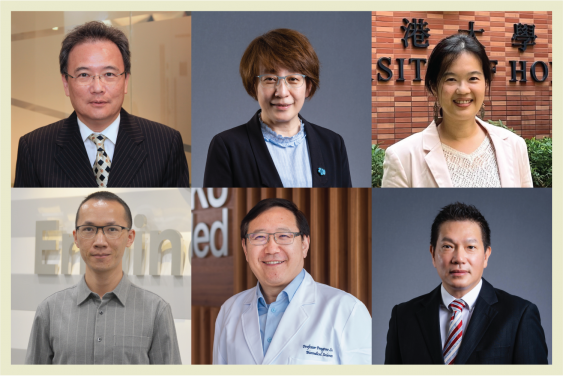
Leaders of six HKU research projects
(upper row from left) Professor Victor O.K. Li, Professor Barbara Chan, Dr Wei-Ning Lee
(second row from left) Dr Chenshu Wu, Professor Liu Pengtao, Professor Billy Chow,
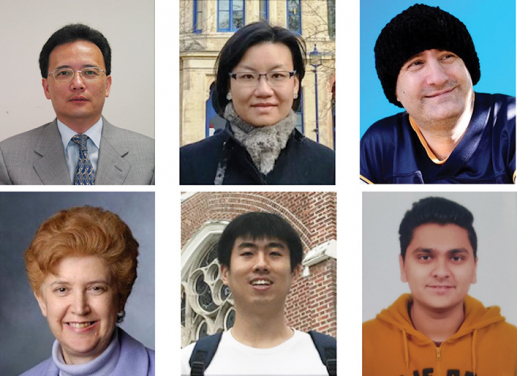
(from upper row clockwise) Professor Victor O.K. Li, Dr Jacqueline C.K. Lam, Dr Jocelyn Downey, Mr Tushar Kaistha and Mr Han Yang from the Department of Electrical and Electronic Engineering, HKU; and Professor Illana Gozes from Tel Aviv University
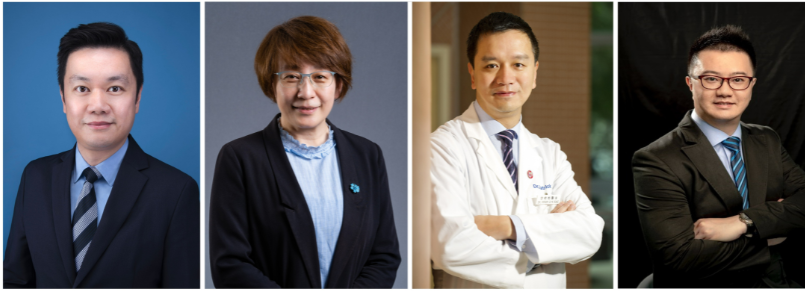
(From left) Dr Chun Hoi Yan, Department of Orthopaedics & Traunatology, Professor Barbara Chan, Department of Mechanical Engineering, HKU; Professor Patrick Shu-Hang Yung and Proessor Michael Tim-Yun Ong, CUHK
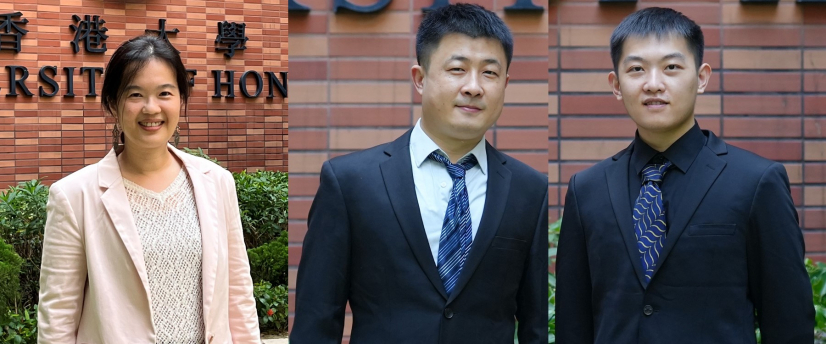
(From left) Dr Wei-Ning Lee, Dr Jinping Dong, and Mr Haotian Guan, Department of Electrical and Electronic Engineering, HKU
- 1 / 7
- 2 / 7
- 3 / 7
- 4 / 7
- 5 / 7
- 6 / 7
- 7 / 7
Six research teams from the Faculties of Engineering, Science and Li Ka Shing Faculty of Medicine, the University of Hong Kong (HKU) were awarded the Healthy Longevity Catalyst Awards (Hong Kong) 2022 in the Healthy Longevity Global Competition.
The competition is held by the United States National Academy of Medicine (NAM) with the Research Grants Council as its Hong Kong sponsor. A total of ten research teams from Hong Kong were awarded this year.
Launched in 2019, the Healthy Longevity Global Grand Challengeoffers opportunities for innovators, scientists, and entrepreneurs to catalyse breakthrough discoveries and innovations that could leapfrog existing barriers and jumpstart new solutions, thereby propelling the field of ageing research and improving the health of persons as they age. The competition composed three phases of Awards- Catalyst Award, Accelerator Award and the Grand Prize.
The Catalyst Awards reward bold, new, potentially transformative ideas from fields such as biomedicine, behavioural science, sociology, engineering and infrastructure, technology, policy, to improve the physical, mental, or social well-being for people as they age, and in a measurable and equitable way. In particular, NAM seeks ideas that will extend the human health span through innovations in disease prevention, biology, mobility and function, social connectedness, productive longevity and more. Ideas could focus on early-, mid-, or late-life, as long as it ultimately promotes health as people age.
Of the ten Catalyst Awards in Hong Kong this year, each includes a US$50,000 (approx. HK$389,000) cash prize at a maximum for a period of 12 months and travel subsidies (HK$30,000 per person; max. 6 persons per team) for awarded teams to attend an Innovator Summit in 2023.
Of the six HKU research projects awarded, four are from the Faculty of Engineering
Project one
AI-driven causal model to determine upstream definitive genetic biomarkers for early detection of Late-Onset Alzheimer’s Disease
Project leader: Professor Victor O.K. LI, Chair of Information Engineering, Cheng Yu-Tung Professorship in Sustainable development, Department of Electrical and Electronic Engineering, Faculty of Engineering
About the project:
To identify breakthrough Alzheimer’s Disease (AD) treatments, the research group developed a novel AI and big data-driven methodology. The approach combines AI with neuroscience and immunology, and contributes a methodological breakthrough by incorporating expert knowledge in GNN-based graph neural network biomedical graph construction, which covers genetic mutations and pathological knowledge. The novel approach, both AI- and expert-led, capturing the best of both worlds, is expected to greatly improve the speed and accuracy of drug discovery for AD.
Project two
Engineered osteochondral tissue (eOCT) as advanced therapeutic treatment for osteoarthritis (OA)
Project leader: Professor Barbara CHAN, Professor, Department of Mechanical Engineering, Faculty of Engineering
About the project:
Osteoarthritis (OA) is among the most prevalent degenerative disorders in aged populations worldwide. It affects the entire joint with eroded cartilage, compromised osteochondral interface and abnormally remodelled bone, leading to severe pain, reduced motility and poor quality of life. The research team developed engineered osteochondral tissue (eOCT) with proper zonal organization using bone marrow (BM) MSCs that could effectively modify OA. This work could lead to novel therapeutics for OA, contributing to the grand challenge in healthy longevity.
Project three
Empowering Acoustic Sensing and Learning on Accessible Speakers to Monitor and Detect Older Adult Falls
Project leader: Dr Chenshu WU, Assistant Professor, Department of Computer Science, Faculty of Engineering
About the project:
Falls are the leading cause of accidental injury death worldwide for older adults. About 700 thousand fatal falls and over 37 million severe falls requiring medical attention are reported each year. This project aims to develop a contactless smart sensing system that allows reliable fall detection and offer unparalleled insight into fall-related activities. The researchers achieve so by empowering the prevalent and accessible smart speakers with non-invasive acoustic sensing and learning. With improved user comfort and decreased costs, more people worldwide will benefit from contactless fall monitoring. Importantly, the accumulated fall-related data can provide physicians with medical insight to avoid falls. Ubiquitous fall monitoring today can prevent fall tragedies and improve healthy aging tomorrow.
Project four
Intelligent ultrasonic assessment of muscle quality for a functionally healthy elderly life
Project leader: Dr Wei-Ning LEE, Associate Professor, Department of Electrical and Electronic Engineering, Faculty of Engineering
About the project:
Maintaining functional ability is central to physical and mental well-being in older age. Motility, which is endowed by skeletal muscle, is an intrinsic capacity pertinent to functional ability. The goal of this project is to develop a personalized data-driven model enabled by a physics-informed neural network (PINN) and noninvasive ultrasonic measures for assessment of muscle quality, which is herein defined by muscle stiffness and movement. The research team developed a scientific machine learning model, PINN, which is governed by muscle mechanics, to learn from muscle stiffness and kinematics, which will be quantified by the team’s ultrasound elastography method. Ultimately, the project aims to provide a new mathematical formulation of the skeletal muscle mechanics in vivo, establish an unprecedented quantitative tool for personalized examination of muscle conditions, and promote a sustainable healthy lifestyle powered by high-quality skeletal muscle as we age.
The two projects from the Li Ka Shing Faculty of Medicine and the Faculty of Science are:
Project five
A novel human cellular system for studying normal ageing and anti-ageing drug screen
Project leader: Professor LIU Pengtao , Professor, School of Biomedical Sciences, Li Ka Shing Faculty of Medicine
About the project: Ageing is a natural process but brings social and economic burden to the society. Besides causing detrimental health issues to the elderly, the biological process of ageing is implicated in many human diseases such as cancer. Studying human ageing directly can be time-consuming.
The placenta is an essential organ in human life, where the trophoblasts nourish and protect the fetus. Two major types of trophoblasts (syncytiotrophoblast or STB, and extravillus trophoblast or EVT) are produced from trophoblast progenitors. This is an accelerated process of ageing, which is accompanied by multiple ageing manifestations. Trophoblast stem cells or TSCs, with trophoblast progenitor properties, can be established in culture dish from human in vivo tissues and pluripotent stem cells such as Expanded Potential Stem Cell (hEPSC) and induced to differentiate to STB or EVT, which mimic the natural process in the placenta. The entire differentiation process only takes around 10 days thus can be used to facilitate studying human cell ageing.
The team proposes to use the in vitro human TSC to STB as a novel cellular system to investigate human ageing and to identify anti-ageing drug candidates.
Project six
Development of Small-Molecule Modulators of the Secretin Receptor as Novel Anti-Hypertensive Agents
Project leader: Professor Billy CHOW , Chair of Endocrinology, School of Biological Sciences, Faculty of Science
About the project:
Large segments of ageing hypertensive patients are resistant to a wide range of conventional drugs and hence there is an urgent need for new initiatives to develop alternative treatments. The research team developed the first small molecule-based Secretin receptor modulator (KSD179019), which not only has a similar blood pressure lowering effect as SCT peptide but, more importantly, has a much longer half-life (~8 hours). The development of KSD179019 as a novel class of oral anti-hypertensive drug can be of critical importance, as it could tackle resistant hypertension. This project could potentially provide an important advancement in finding novel small molecule drugs for resistant hypertension by targeting Secretin receptor.
The Healthy Longevity Catalyst Awards (Hong Kong) 2022: https://healthylongevitychallenge.org/category/research-grants-council-of-the-hong-kong-special-administrative-region-china/?post_types=winner&post_date=2022-01-01+2022-12-31
Research Grants Council webpage: https://www.ugc.edu.hk/eng/rgc/funding_opport/hlca/
The US NAM Healthy Longevity Challenge: https://healthylongevitychallenge.org/about-us/
Media enquiries:
Faculty of Engineering, HKU
Ms Celia Lee, tel: 3917 8519/ email: leecelia@hku.hk
Ms Charis Lai, tel: 3917 1924/ email: chariskc@hku.hk
Li Ka Shing Faculty of Medicine, HKU
Email: medmedia@hku.hk
Faculty of Science, HKU
Ms Casey To, tel: 3917-4948/ email: caseyto@hku.hk
Ms Cindy Chan, tel: 3917-5286/ email: cindycst@hku.hk

